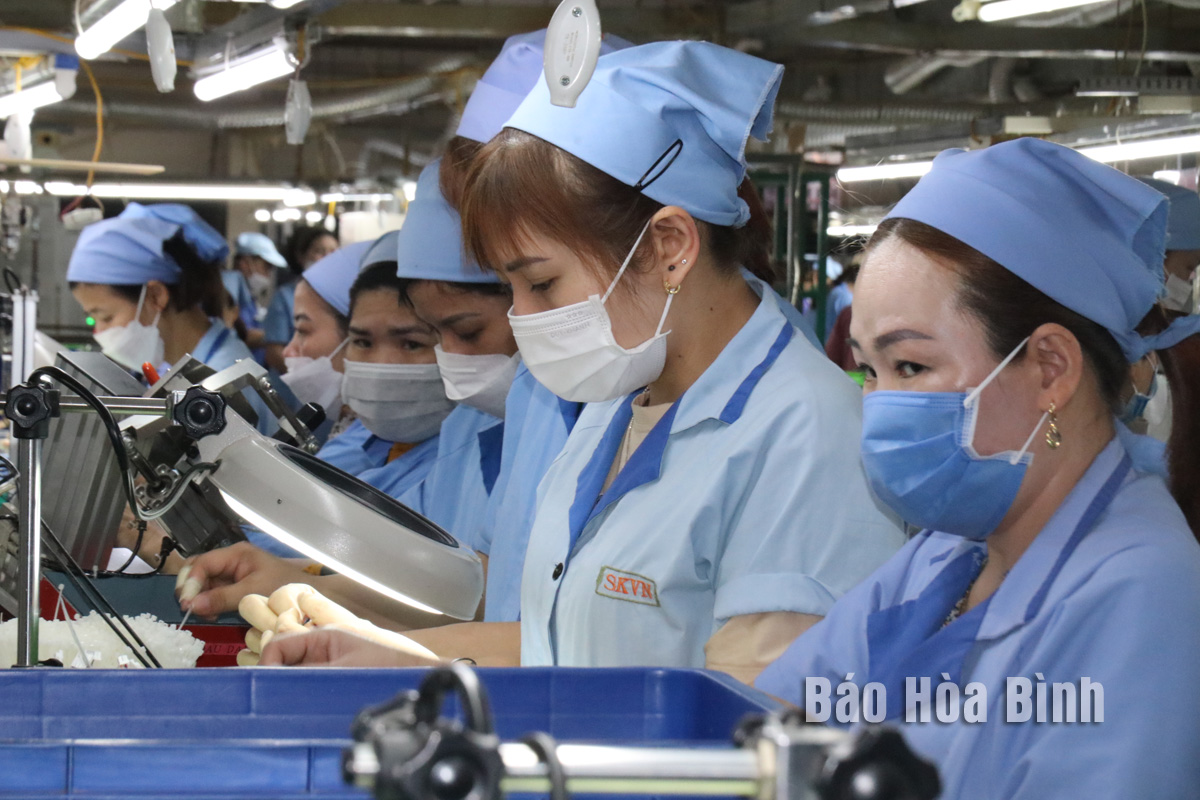
The Socio-economic Development Strategy for the 2021 - 2030 period affirms that science - technology and innovation are one of the important strategic breakthroughs. Accordingly, developing science, technology and innovation is a top national policy, and a main driving force to promote growth, and create breakthroughs in productivity, quality and efficiency.
Developing science, technology and innovation contributes to creating many high-quality products for Hoa Binh.
In Hoa Binh province, after three years of implementing Project No. 04-DA/TU, dated October 11, 2021, of the provincial Party Committee’s Standing Board on developing science, technology and innovation associated with innovating and improving the quality of education and human resources development in the 2021 – 2025 period, the project's goals have been basically achieved and some of them have been surpassed.
In recent years, the provincial Party Committee, the provincial People's Council, and the provincial People's Committee have issued resolutions, plans, and documents to perfect policies, and directed the implementation of tasks on science, technology and innovation development, associated with the innovation and improvement of the quality of education and high-quality human resources development. A typical example is the provincial Party Committee's Resolution on increasing resources for education and training development to meet innovation requirements in Hoa Binh province in the 2023-2030 period.
In addition, the provincial People's Committee has approved a provincial-level science and technology task on developing and implementing policies to attract high-quality human resources to work at industrial parks in the province, and carrying out the provincial Party Committee's project on agricultural development, and promotion of product consumption associated with new-style rural area building in the 2021-2025 period.
The province has implemented four public investment projects in the science and technology sector for the 2021-2025 period, focusing on increasing investment in modern facilities and equipment.
In addition, the province has stepped up incubation activities and increased support for the establishment of businesses and science and technology organisations. To date, Hoa Binh has 25 organisations and 11 enterprises operating in the field of science and technology.
It can be said that the results achieved in recent times have contributed positively to the province's overall socio-economic development, and are an important foundation to create sustainable development momentum in the new period.
In the coming time, to speed up the implementation of the strategy on science-technology and innovation development, the province will continue to strengthen the leadership and direction of Party committees and authorities at all levels, the coordination of the Fatherland Front and socio-political organisations, and the supervision of local people.
It will uphold the responsibility of heads of agencies and units in directing and organising the implementation of tasks and plans to implement Project No. 04 -DA/TU, and step up dissemination of information to raise awareness of businesses about the role of investment in science and technology development in their sustainable development.
Hoa Binh province is undergoing a dynamic transformation amid Vietnam’s national digital transition. Building on Poliburo’s Resolution No. 57-NQ/TW on breakthroughs in science, technology, innovation, and national digital transformation, the province has rolled out a wide range of practical action plans. A standout initiative is the "Digital Literacy for All” movement, an effort to ensure that no one is left behind in the digital era.
Hoa Binh province is undergoing a dynamic transformation in the wake of the national digital transformation movement. Building on Resolution No. 57-NQ/TW of the Politburo on breakthroughs in science, technology, innovation, and national digital transformation, the province has implemented a wide range of practical action plans. A standout initiative is the "Digital Literacy for All” movement ambitious effort to ensure that no one is left behind in the digital age.
With a spirit of unity and proactive problem-solving, the Party Committee, the government and the people of Dong Lai Commune (Tan Lac District) have made great strides in implementing the resolutions of the 24th Party Congress of the commune for the 2020 - 2025 term. Focusing on leadership and practical actions, the commune has brought the Party’s resolutions into daily life, creating strong impacts and pushing the local development forward.
Amid the nationwide push for digital transformation, young people in Hoa Binh Province are stepping up as dynamic pioneers, applying technology to enhance Youth Union operations and expand the reach of youth-led initiatives. Through creativity and adaptability, Youth Union organizations at all levels have introduced a series of practical solutions, contributing to modern governance and community development.
In recent years, An Nghia commune, located in Lac Son district, has stepped up administrative reform, focusing on improving the quality and efficiency of its single-window service unit for receiving and processing administrative procedures. These improvements have helped create favourable conditions for local residents and organisations to handle administrative procedures, contributing to the commune’s broader socio-economic development.
The Prime Minister-approved master plan to develop the multi-use value of forests ecosystems through 2030, with a vision to 2050, aims to improve the management and sustainable use of forest resources, create jobs, increase incomes, and improve the living standards of ethnic minorities, people in mountainous and remote areas, forest workers and those living near forests.



